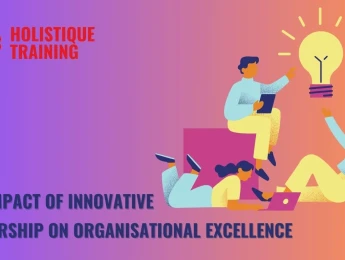- Table of Contents
- Introduction
- What Is Innovative Leadership?
- What Are the Features of Innovative Leadership?
- Visionary Thinking
- Risk-Taking and Experimentation
- Empowerment and Collaboration
- Adaptability and Resilience
- Continuous Learning
- Why Is Innovative Leadership Important? (Its Effect on Organisational Excellence)
- Fostering Innovation and Creativity
- Driving Competitive Advantage
- Cultivating a Culture of Excellence
- Enhancing Employee Engagement and Satisfaction
- Fueling Continuous Improvement
- Fostering a Culture of Agility and Adaptability
- How to Become an Innovative Leader
- 1- Embrace Vulnerability and Authenticity
- 2- Encourage Diverse Perspectives
- 3- Promote Psychological Safety
- 4- Lead by Example
- 5- Invest in Learning and Development
- 6- Empower and Delegate
- 7- Foster a Culture of Innovation
- The Role of Innovative Leadership in Cultivating a Great Workplace Culture
- Inspiring Purpose and Meaning
- Nurturing Trust and Transparency
- Promoting Collaboration and Camaraderie
- Recognising and Celebrating Achievements
- Encouraging Work-Life Balance
- Conclusion
Introduction
Innovation isn't just about groundbreaking ideas or disruptive technologies; it's also about leadership. Innovative leadership is the catalyst that propels organisations toward excellence, shaping cultures, fostering creativity, and driving progress. In this exploration, we delve into the essence of innovative leadership and its profound influence on organisational excellence.
What Is Innovative Leadership?
Innovative leadership embodies a mindset that embraces change, challenges conventions, and seeks continuous improvement. It's about inspiring teams to think creatively, take calculated risks, and adapt swiftly to evolving landscapes. Innovative leaders don't merely manage; they envision possibilities, ignite passion, and empower others to unleash their full potential.
Innovative leadership transcends traditional notions of authority and management by fostering a dynamic ecosystem where ideas flourish, and individuals thrive. It's about creating a culture where innovation is encouraged and celebrated as a fundamental driver of progress. Innovative leaders cultivate an environment where curiosity is nurtured, failure is reframed as a stepping stone to success, and experimentation is embraced as a pathway to discovery. They recognise that innovation often emerges from the intersection of diverse perspectives and disciplines, and they actively seek out opportunities to foster interdisciplinary collaboration and cross-pollination of ideas. By championing a mindset of possibility and a spirit of exploration, innovative leaders inspire teams to push beyond perceived limitations and pioneer new frontiers of knowledge and achievement.
What Are the Features of Innovative Leadership?
Visionary Thinking
Innovative leaders are keen to envision the future and articulate a compelling vision that inspires others to act. They see beyond the constraints of the present and imagine possibilities that others may overlook. This visionary thinking enables them to anticipate trends, identify opportunities, and chart a course toward long-term success. By painting a vivid picture of what could be, innovative leaders ignite passion and instil a sense of purpose that motivates individuals and teams to strive for greatness.
Risk-Taking and Experimentation
In pursuing innovation, risk-taking is not merely tolerated—it's embraced as an essential catalyst for growth. Innovative leaders understand that progress often involves stepping into the unknown and are willing to take calculated risks to drive meaningful change. They create safe spaces for experimentation where failure is viewed not as a setback but as a valuable learning experience. By encouraging curiosity, exploration, and bold experimentation, innovative leaders empower their teams to push boundaries and explore new frontiers of possibility.
Empowerment and Collaboration
Innovative leaders recognise that a team's collective intelligence surpasses any individual's. They foster an environment of empowerment where team members are encouraged to take ownership of their work, make decisions autonomously, and contribute their unique perspectives to the collective effort. Through collaboration and shared purpose, innovative leaders harness their teams' diverse talents and expertise, driving innovation and achieving collective goals that surpass what any person could accomplish alone.
Adaptability and Resilience
Change is inevitable, and innovative leaders understand the importance of adaptability in navigating dynamic environments. They embrace uncertainty as an opportunity for growth, remaining flexible and resilient in adversity. Rather than clinging to outdated strategies or processes, they welcome change as a catalyst for innovation and adaptation. By fostering a culture of resilience and agility, innovative leaders equip their teams to thrive amidst uncertainty and emerge stronger from challenges.
Continuous Learning
Innovative leaders are lifelong learners committed to personal and professional growth. They understand that innovation thrives on new ideas, insights, and perspectives, and they actively seek out opportunities for learning and self-improvement. They cultivate a culture of continuous learning within their organisations through formal education, professional development programs, or informal mentorship relationships. By leading by example and demonstrating a growth mindset, innovative leaders inspire their teams to embrace change, challenge assumptions, and pursue excellence at every opportunity.
In summary, innovative leadership features visionary thinking, risk-taking and experimentation, empowerment and collaboration, adaptability and resilience, and a commitment to continuous learning. By embodying these qualities, innovative leaders inspire creativity, drive progress, and cultivate environments where innovation flourishes, propelling organisations toward excellence in an ever-evolving world.
KPIs | Description |
Visionary Leadership | Inspires with a compelling future vision |
Collaboration and Team Empowerment | Fosters teamwork and empowers individuals |
Adaptability and Change Management | Navigates change and embraces innovation |
Creativity and Risk-Taking | Encourages creativity and calculated risks |
Continuous Learning and Development | Promotes growth mindset and skill-building |
Table 1: KPIs for an Innovative Leader
Why Is Innovative Leadership Important? (Its Effect on Organisational Excellence)
Innovative leadership is the cornerstone of organisational excellence, driving transformative change and sustainable growth. Here's how it shapes the trajectory of an organisation:
Fostering Innovation and Creativity
Innovative leadership is the lifeblood of organisational innovation and creativity. By fostering a culture where novel ideas are celebrated, and experimentation is encouraged, innovative leaders unlock the full creative potential of their teams. They create spaces where diverse perspectives can converge, sparking new insights and breakthrough solutions to complex challenges. In doing so, they propel their organisations to the forefront of innovation, driving competitive advantage and sustainable growth in rapidly evolving markets.
Driving Competitive Advantage
In today's hyper-competitive landscape, innovation is the cornerstone of sustainable success. Organisations led by innovative leaders are more agile, adaptive, and responsive to market dynamics. By embracing change and disruption, they stay ahead of the curve, anticipating shifts in consumer preferences, emerging technologies, and industry trends. This proactive approach to innovation enables them to differentiate themselves from competitors, capture new opportunities, and maintain a leading edge in their respective markets.
Cultivating a Culture of Excellence
Innovative leadership sets the tone for organisational culture, shaping values, norms, and behaviours that drive excellence. Innovative leaders foster trust and collaboration within their teams by championing transparency, accountability, and integrity. They create environments where individuals feel empowered to take risks, share ideas, and challenge the status quo. This culture of excellence permeates every aspect of the organisation, from decision-making processes to customer interactions, positioning it for long-term success and sustainability.
Enhancing Employee Engagement and Satisfaction
Engaged and satisfied employees are the backbone of high-performing organisations. Innovative leaders understand the importance of fostering a positive work environment where individuals feel valued, empowered, and inspired to contribute their best work. By providing meaningful opportunities for growth, recognition, and advancement, they cultivate a sense of purpose and fulfilment among team members. As a result, employees are more committed, motivated, and passionate about their roles, driving productivity, innovation, and organisational success.
Fueling Continuous Improvement
Innovation is not a destination but a journey—a continuous process of improvement and evolution. Innovative leaders instil a mindset of continuous improvement within their organisations, encouraging teams to challenge assumptions, embrace feedback, and strive for excellence in everything they do. They create mechanisms for soliciting stakeholder input, measuring performance, and iterating on strategies and processes based on insights and lessons learned. This relentless pursuit of improvement drives organisational agility and resilience, enabling organisations to adapt and thrive in an ever-changing world.
Fostering a Culture of Agility and Adaptability
Innovative leadership is pivotal in driving organisational excellence by fostering a culture of agility and adaptability. In today's rapidly changing business landscape, organisations must be agile and responsive to evolving market dynamics. Innovative leaders anticipate disruptions, pivot strategically and position their organisations for sustained success in the face of uncertainty. By cultivating a mindset of flexibility and resilience, they empower teams to navigate challenges, seize opportunities, and thrive in a volatile and unpredictable environment.
In short, innovative leadership is paramount to organisational excellence. It drives innovation, fosters a culture of excellence, and empowers teams to achieve their full potential. By embracing the principles of innovative leadership and cultivating environments where creativity, collaboration, and continuous improvement are valued and celebrated, organisations can position themselves for success in today's dynamic and competitive landscape. As leaders, we lead with vision, courage, and innovation, inspiring others to join us on the journey toward organisational excellence.
How to Become an Innovative Leader
Becoming an innovative leader requires deliberately developing key competencies and nurturing certain behaviours. Here are some strategies to cultivate innovative leadership:
1- Embrace Vulnerability and Authenticity
Authenticity is the cornerstone of innovative leadership. To cultivate authenticity, leaders must be willing to embrace vulnerability—to show up as their true selves, flaws and all. By demonstrating vulnerability, leaders create connections based on trust and mutual respect, fostering an environment where creativity and innovation can thrive. Authentic leaders lead with integrity, transparency, and empathy, inspiring others to do the same.
2- Encourage Diverse Perspectives
Innovation flourishes in environments where diverse perspectives are welcomed, respected, and valued. As an innovative leader, creating spaces where individuals feel empowered to share their unique insights and experiences is essential. Actively seek out diverse voices and perspectives within your team, recognising that innovation often emerges from the intersection of different ideas, backgrounds, and disciplines.
3- Promote Psychological Safety
Psychological safety is the foundation of a culture of innovation. It's the belief that one can take risks, speak up, and express dissent without fear of judgment or retribution. As a leader, it's your responsibility to cultivate psychological safety within your team by creating an atmosphere of trust, respect, and open communication. Encourage constructive feedback, celebrate experimentation, and view failures as valuable learning opportunities.
In theOyster HR 2023 report, a staggering 84% of employees prioritise psychological safety above all else in the workplace. This sentiment is echoed byAccenture's findings, which indicate that fostering psychological safety reduces turnover by 27% and boosts engagement by an impressive 76%. These statistics underscore the critical importance of creating environments where employees feel safe to voice their opinions, take risks, and collaborate freely, ultimately driving organisational success and employee satisfaction.
4- Lead by Example
As a leader, your actions speak louder than words. Model the behaviours you wish to see in others—embrace change, demonstrate resilience, and exhibit a growth mindset. Be open to feedback, admit when you're wrong, and show humility in acknowledging mistakes. By leading by example, you inspire your team to embrace innovation as a shared journey and cultivate a culture of continuous improvement.
5- Invest in Learning and Development
Innovation thrives on curiosity, exploration, and lifelong learning. As an innovative leader, prioritise your own learning and development, staying abreast of emerging trends, technologies, and best practices in your field. Invest in opportunities for skill-building, mentorship, and cross-functional collaboration, both for yourself and your team members. Create a culture that values continuous learning and encourages experimentation, creativity, and innovation at every level.
6- Empower and Delegate
Effective leaders empower their team members to make decisions, take ownership of projects, and contribute their unique talents and perspectives. Delegate responsibilities and authority, providing individuals with the autonomy and support they need to excel. Trust your team to deliver results, and celebrate their achievements along the way. By empowering others, you foster a sense of ownership and accountability, unleashing the full potential of your team and driving innovation throughout the organisation.
7- Foster a Culture of Innovation
Cultivate a culture that values innovation, creativity, and collaboration as core principles. Encourage cross-functional collaboration, interdisciplinary teamwork, and knowledge-sharing across the organisation. Create spaces for brainstorming, creativity, and experimentation, where individuals are encouraged to explore new ideas, challenge assumptions, and push the boundaries of what's possible. Celebrate successes, recognise contributions, and learn from failures, reinforcing a culture of continuous improvement and innovation.
In summary, becoming an innovative leader requires a combination of self-awareness, empathy, courage, and a commitment to lifelong learning and growth. By embracing authenticity, promoting diversity and inclusion, fostering psychological safety, leading by example, investing in learning and development, empowering others, and fostering a culture of innovation, leaders can inspire creativity, drive progress, and cultivate environments where individuals and teams can thrive. As leaders, let us embrace the challenge of leading with innovation, encouraging others to join us toward organisational excellence.
The Role of Innovative Leadership in Cultivating a Great Workplace Culture
Great workplace cultures don't happen by accident; they're intentionally cultivated by visionary leaders who prioritise people, purpose, and progress. Here's how innovative leadership contributes to a thriving workplace culture:
Inspiring Purpose and Meaning
Innovative leaders inspire purpose and meaning by aligning organisational goals with a higher mission or vision. They articulate a compelling narrative that connects individual contributions to the organisation's broader purpose. By fostering a sense of shared mission and collective identity, they instil a deep sense of purpose and fulfilment in the work that individuals do, driving engagement, motivation, and commitment.
Nurturing Trust and Transparency
Trust is the bedrock of any healthy workplace culture. Innovative leaders cultivate trust by demonstrating integrity, authenticity, and transparency in their words and actions. They communicate openly, honestly, and proactively, keeping team members informed and involved in decision-making processes. By fostering a culture of trust, innovative leaders create an environment where individuals feel safe to take risks, express their opinions, and challenge the status quo.
Promoting Collaboration and Camaraderie
Collaboration is essential for innovation and growth. Innovative leaders foster collaboration by breaking down silos, encouraging cross-functional teamwork, and creating opportunities for meaningful interactions and shared experiences. They promote a camaraderie and mutual support culture, where individuals feel valued, respected, and appreciated for their unique contributions. Innovative leaders create a sense of belonging and unity that drives collective success by fostering connections and building strong relationships among team members.
Recognising and Celebrating Achievements
Celebration and recognition are powerful drivers of workplace culture. Innovative leaders celebrate achievements, big and small, and recognise the contributions of individual team members. They create rituals and traditions honouring successes and milestones, fostering a culture of appreciation, gratitude, and recognition. By acknowledging their teams' efforts and accomplishments, innovative leaders inspire motivation, loyalty, and a sense of pride in the organisation's shared achievements.
Encouraging Work-Life Balance
Work-life balance is essential for employee well-being and productivity. Innovative leaders prioritise work-life balance by promoting flexibility, autonomy, and respect for personal boundaries. They encourage employees to prioritise self-care, manage their energy levels, and maintain a healthy balance between work and personal life. By supporting initiatives such as flexible work arrangements, remote work options, andwellness programs, innovative leaders demonstrate a commitment to the holistic well-being of their team members. It’s no surprise that nearly 95% of organisations augmented their investment in well-being initiatives in 2021, according toTeamstage.
In summary, innovative leadership is central to cultivating a great workplace culture characterised by purpose, trust, collaboration, recognition, and work-life balance. By inspiring purpose and meaning, nurturing trust and transparency, promoting collaboration and camaraderie, recognising and celebrating achievements, and encouraging work-life balance, innovative leaders create environments where individuals feel valued, empowered, and inspired to do their best work. As stewards of organisational culture, let us embrace the challenge of leading with innovation and empathy, inspiring others to join us on the journey toward a workplace culture where everyone can thrive.
Conclusion
In conclusion, innovative leadership is the cornerstone of organisational excellence. It shapes cultures, drives innovation, and fosters environments where individuals and teams can thrive. Organisations can unleash their full potential and chart a course toward greatness by embodying innovative leadership principles and cultivating a culture of creativity, collaboration, and continuous improvement. As leaders, let us embrace the challenge of leading with innovation and inspire others to join us on this transformative journey.
In your journey towards mastering innovative leadership, elevate your skills with our course, ‘Technological Leadership for the Digital Era.’ Dive into cutting-edge strategies, gain insights from industry experts, and navigate the complexities of leading in a rapidly evolving digital landscape. Equip yourself with the tools to drive innovation, harness technology for organisational success, and steer your team toward unprecedented heights. Seize the opportunity to become a trailblazer in the digital era – enrol now and be at the forefront of shaping the future of leadership. Let innovation be your guide as you embark on a transformative learning experience!

























